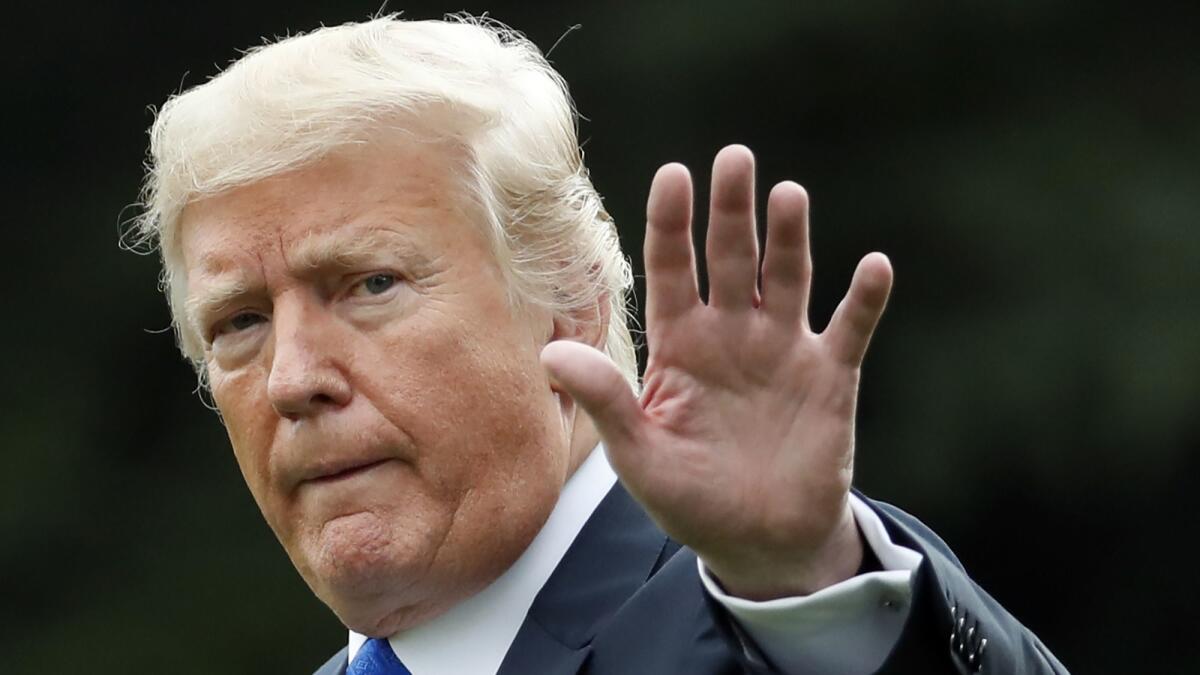Trump backs down on order to declassify Russia documents

- Share via
Reporting from Washington — President Trump on Friday backed down from his order to declassify certain documents from the Russia investigation, including text messages exchanged among law enforcement leaders.
The decision will likely disappoint conservative House Republicans and media figures who had encouraged the president to release the materials. Some of the president’s allies have insisted the documents would undercut special counsel Robert S. Mueller’s probe into whether Trump’s campaign conspired with Russians during the presidential election.
“I met with the [Department of Justice] concerning the declassification of various UNREDACTED documents. They agreed to release them but stated that so doing may have a perceived negative impact on the Russia probe,” Trump tweeted on Friday.
“Also, key Allies’ called to ask not to release. Therefore, the Inspector General has been asked to review these documents on an expedited basis. I believe he will move quickly on this (and hopefully other things which he is looking at). In the end I can always declassify if it proves necessary. Speed is very important to me — and everyone!”
Just four days ago, the president had ordered the “immediate declassification” of these documents despite resistance from top law enforcement officials who are reluctant to break with the longstanding practice of withholding records involving a live investigation.
Follow the latest news of the Trump administration on Essential Washington »
The materials include portions of an application to eavesdrop on Carter Page, a former Trump campaign foreign policy advisor, under the Foreign Intelligence Surveillance Act. A heavily redacted version of the application was released earlier this year.
Trump also wanted to publish text messages from, among others, former FBI Director James B. Comey and his former deputy, Andrew McCabe.
In addition, the president ordered the release of notes written by Bruce Ohr, a high-ranking Justice Department official, on his meetings with Christopher Steele, a former British intelligence officer who researched Trump’s ties to Russia. Steele was paid by Fusion GPS, a firm hired by Democrats during the campaign, and his findings were compiled into a now-famous dossier that includes several unproven allegations about Trump.
It was unclear whether Trump’s tweet on Friday will lead to any new steps by the Justice Department inspector general, who was already reviewing aspects of the Russia investigation, particularly the surveillance of Page.
After Page left the Trump campaign — and weeks before the presidential election — the Justice Department applied for a warrant to eavesdrop on him because officials suspected he was a Russian agent. A judge approved the warrant, and it was renewed three times, each time by a different judge. Page has not been charged with any crime.
Trump’s decision to walk back his earlier order follows a pattern of his interactions with the Justice Department.
In May, he tweeted that he would demand a probe into whether his campaign was improperly “infiltrated or surveilled” before the election. The request threatened to further expose the role of a confidential informant who participated in the early stages of the Russia investigation.
But after meeting with Deputy Atty. Gen. Rod Rosenstein and FBI Director Christopher A. Wray, Trump seemed to back down. The White House announced that the inspector general would review “any irregularities,” a step that had already been announced the day before by the Justice Department itself.
Trump also called on Atty. Gen. Jeff Sessions to “stop this Rigged Witch Hunt right now” in a tweet on Aug. 1. The president’s lawyer, Rudolph W. Giuliani, later explained in an interview that the tweet was not supposed to be an order.
“The president was expressing his opinion on his favored medium for asserting his 1st Amendment right of free speech,” Giuliani said at the time.
Twitter: @chrismegerian
UPDATES:
9:40 a.m.: This article was updated with more context on the president’s decision and more details about the documents in question.
This article was originally published at 8:55 a.m.
More to Read
Get the L.A. Times Politics newsletter
Deeply reported insights into legislation, politics and policy from Sacramento, Washington and beyond. In your inbox twice per week.
You may occasionally receive promotional content from the Los Angeles Times.











